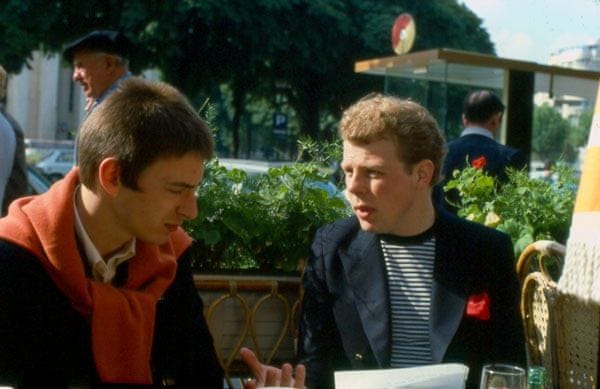I’ve written on this sophisti-pop group previously, here, for Friday Favourites but decided to go into depth on 6 of my favourite Style Council tracks. The group formed in Woking in 1982 after lead vocalist and songwriter Paul Weller had decided to leave arguably the UK’s top punk band at the time, The Jam, for an ‘artier’, ‘jazzier’ route. The Style Council is original, inventive, and eclectic; here are 6 tracks to consider for your music library.
1. The Whole Point Of No Return
Track 2 on the band’s official debut album Café Bleu, ‘The Whole Point Of No Return’ demonstrates Paul Weller’s quite intense genre shift from The Jam to The Style Council. The instrumentation is stripped back with Weller’s vocals accompanied solely by a gentle electric guitar, creating a dreamy, tender atmosphere. Compared to, in traditional punk fashion, The Jam’s mod-rock, drum-heavy usual tracklist, The Style Council has much more ‘simple’, soft songs like this one. However, just like in The Jam, Weller continues to portray his political correspondence through his music. ‘The Whole Point Of No Return’ comments on the ruling classes, specifically the UK royals, who have been given a privilege in society since birth. Weller directly states that the working class listener should be “rising up and taking back the property of every man” - a clear message to society. What I’ve come to discover with this group is that The Style Council’s political messages are usually quite on the nose - “The law’s made for and by the rich”. Weller definitely doesn’t skirt around the topic.
2. Shout To The Top
I’ve spoken about this song in my previous article, but I cannot avoid it for this week’s playlist. ‘Shout To The Top’ is one of my favourite songs of all time. One of my desert island tracks. Top 10. Perfection. It was released as the band’s seventh single in 1984, during the peak of PM Margaret Thatcher’s tenure - which is greatly relevant. Again, Weller speaks to his audience: “we’re gonna shout to the top” against the British government’s cruel disregard for the ordinary man. The song begins with aggressive strings, rapid drums, and intense piano stabs which evokes a feeling of frustration and a desire for change. As the song progresses from introduction, to verse, to chorus, the instrumentation builds up along with Weller’s vocals. ‘Shout To The Top’ is more than a simple protest song the late 20th century was littered with; the track is personal, angry, and demanding - something the majority of Britain’s population could relate to and was stirred by.
3. Heavens Above
Paul Weller was knowingly inspired by funk/jazz artists such as Marvin Gaye, Charles Mingus, and The Headhunters. In ‘Heavens Above’ from The Style Council’s third studio album The Cost of Loving (1987), these influences are extremely evident. Billy Chapman’s saxophone segments dominate the track, showcasing a funk-infused environment the entire album experimented with. Alongside Weller, Dee C. Lee, who was his wife at the time, sings with forceful, silky vocals. Being quite unknown, there isn’t much out there about the meaning behind this track - the lyrics seem almost mystic with reference to “The Peacemaker” and “paegans of wealth”. ‘Heavens Above’ is a deep-cut that deserves to be more appreciated.
4. It’s A Very Deep Sea
Confessions of a Pop Group (1988) is noted to be parted into separate sides; the first few tracks inspired by piano-heavy, jazz music, and the other rooted in funk inspired melodies. ‘It’s A Very Deep Sea’ is evidently, as the first song on the album, connected to the first musical segment. In this song, Weller attempts to illustrate the feeling of intense contemplativeness and the dangers of locking oneself in the past. The dark, echoing piano serves as a base for the song as it almost duets with Weller’s anguished vocals. The repetition of “diving” demonstrates this image of a literal diver “go[ing] down into the depths” of the ocean; a symbol of someone who cannot escape their mind. Against the backdrop of strong piano chords in the final part of the song, Weller repeats “perhaps i’ll come to the surface and come to my senses” again and again before the overdubbed “diving” comes in again. ‘It’s A Very Deep Sea’ is a pensive song which depicts the feeling of woefully succumbing to the heavy weights of one’s past.
5. Speak Like A Child
Going back to the beginning, ‘Speak Like A Child’ was the first single The Style Council released, in 1983. The entire song is upbeat and joyful, with a loud, brassy introduction. Compared to the other four songs listed so far, this one is simple and, seemingly, innocent; an ode to a new love. Weller speaks through the voice of one in a new relationship; a hopeless devotee who “spen[ds] all day thinking about [them]” and “all night coming to terms with it”. “It” would be his infatuation. The idea that his lover “speak[s] like a child” symbolises how this relationship brings out the innocence of his mind and allows him to feel “so free and so wild”. The song is charming and cheerful - a classic Style Council track.
6. Walls Come Tumbling Down
Again, an upbeat track, but with much more earnest lyricism. ‘Walls Come Tumbling Down’ is another Style Council song that attempts to revolt against the political scene of 1980s Britain. The term of office of Margaret Thatcher was a dark time for many working class citizens; the closing of the mines leading to over 20,000 jobs lost with no promising direction for them to follow. Again, Weller speaks to the audience, “you don’t have to take this crap” and that they can “try changing” the situation they are in. The theme of rebellion is heavy in The Style Council’s discography as Weller’s political agenda has never faltered in his music; “governments crack and systems fall”. Again, the song is brassy and drum-heavy which creates that loud, powerful message Weller wanted to express dually through his lyricism. Like ‘Shout To The Top’, ‘Walls Come Tumbling Down’ is a phenomenal expression of revolution.







Discovered Style Council late in life. Another example of artists zigging when they were expected to zag. Talent won through in the end. Paul Weller is a great artist.
Growing up with The Jam my initial shock at their split didn't last long. I was changing, growing up and it seemed natural that Weller was too. It's probably the Weller I turn to most now except for the extraordinary On Sunset which is possibly my favourite, most complete Weller album. I'm sure you know them but The Blow Monkeys and Dr Robert matched The Style Council well dressed step for step. Robert doesn't like the term sophistipop but whatever they are a playlist of the two bands is one of my most listened. Thank you for the thought provoking piece.